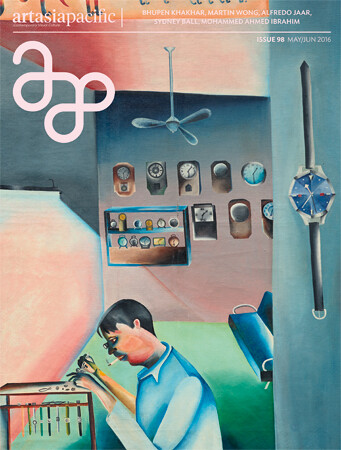ArtAsiaPacific
May/June 2016
Out now
www.artasiapacific.com
Facebook / Twitter / Instagram
The cover feature of ArtAsiaPacific‘s May/June issue looks at accountant-turned-artist-and-writer Bhupen Khakhar (1934–2003), an adored figure in the tight-knit artistic and literary circles in India whose works were witty observations on class and the transformations taking place in a newly independent country. Though he struggled to be openly gay in a straight, largely male-dominated society of the 1960s and ’70s, Khakhar was known for his vibrant, often autobiographical paintings as well as his candid depictions of traditional Indian life.
Also in the Features section is New York-based Chilean artist Alfredo Jaar, who discusses his nearly four-decade exploration of image-making and sociopolitical divisions. Jaar reveals the impetus behind many of his complex and emotionally charged works: his lesser-known Hong Kong Project (1990–93), on the Vietnamese “boat people” crisis, and one of his longest and most challenging endeavors to date, The Rwanda Project (1994–2000), which chronicles one of the most violent acts of ethnic genocide in recent history. Similarly focused on life on the margins was Chinese-American artist Martin Wong (1946–99), a fixture of New York City’s Lower East Side art scene in the 1980s. Wong collected graffiti art and made paintings that captured a New York experiencing a wild outburst of creativity while plagued by crime, drugs and a devastating AIDS epidemic.
Rounding out Features is a comprehensive appraisal of Australian color-field abstractionist Sydney Ball’s five-decade career, including his little-known exploration of semi-figuration in the 1980s and ’90s. Finally, our special feature Inside the Burger Collection looks at Tokyo-based sculptor Motohiko Odani and his works that focus on the human body.
In Profiles, we spotlight Japanese artist Mika Tajima and her paintings that physically translate sound into colorful, patterned canvases; rising artist Ma Qiusha from Beijing, known for her affecting video performances as well as her hypnotic, architecturally inspired watercolor-collage constructions; the peripatetic Nepali Tibetan artist Tenzing Rigdol and his recent work and research on the Tibetan diaspora who seek refuge in India; and Dubai-based curator, collector and philanthropist Dana Farouki.
In Essays, AAP editor at large HG Masters considers modern Turkey’s brief encounter with the most passé of painterly subjects, the nude, while artist and art critic Anthony Leung Po Shan reflects on a recent cross-section of art from Hong Kong presented by Sotheby’s in February.
Our Dispatch takes us to Doha, where Lesley Ann Gray describes a small yet highly ambitious art scene that is maturing on its own terms. Likewise, Singaporean artist Heman Chong questions what more artists can do with the country’s generous cultural policies that over the past two decades have galvanized his generation of local artists, curators and writers. And in One on One, Taipei’s preeminent filmmaker and video artist Chen Chieh-jen ruminates on the short-lived Bitai Thoan association, active between 1925–27 as an early form of art-based resistance in Taiwanese colonial history. In Fine Print, copyright lawyer and photographer Michelle Bogre discusses issues surrounding the copyright of public murals.
For Where I Work, AAP travels to the foot of the Hajar Mountains, on the eastern shores of the United Arab Emirates, to visit the studio of pioneering land artist Mohammed Ahmed Ibrahim. Rounding out the issue, exhibition reviews include: Michael Lin at Museum of Contemporary Art and Design, Manila; Michael Joo at Blain|Southern, London; Nasreen Mohamedi at the Met Breuer, New York; plus much more.
Select articles now online in Arabic and Chinese: artasiapacific.com
Subscribe to the print edition, buy digital copies on iTunes, Google Play, Zinio or Magzter. Also check out our new AAP City Guide app, available now for iOS and Android.
